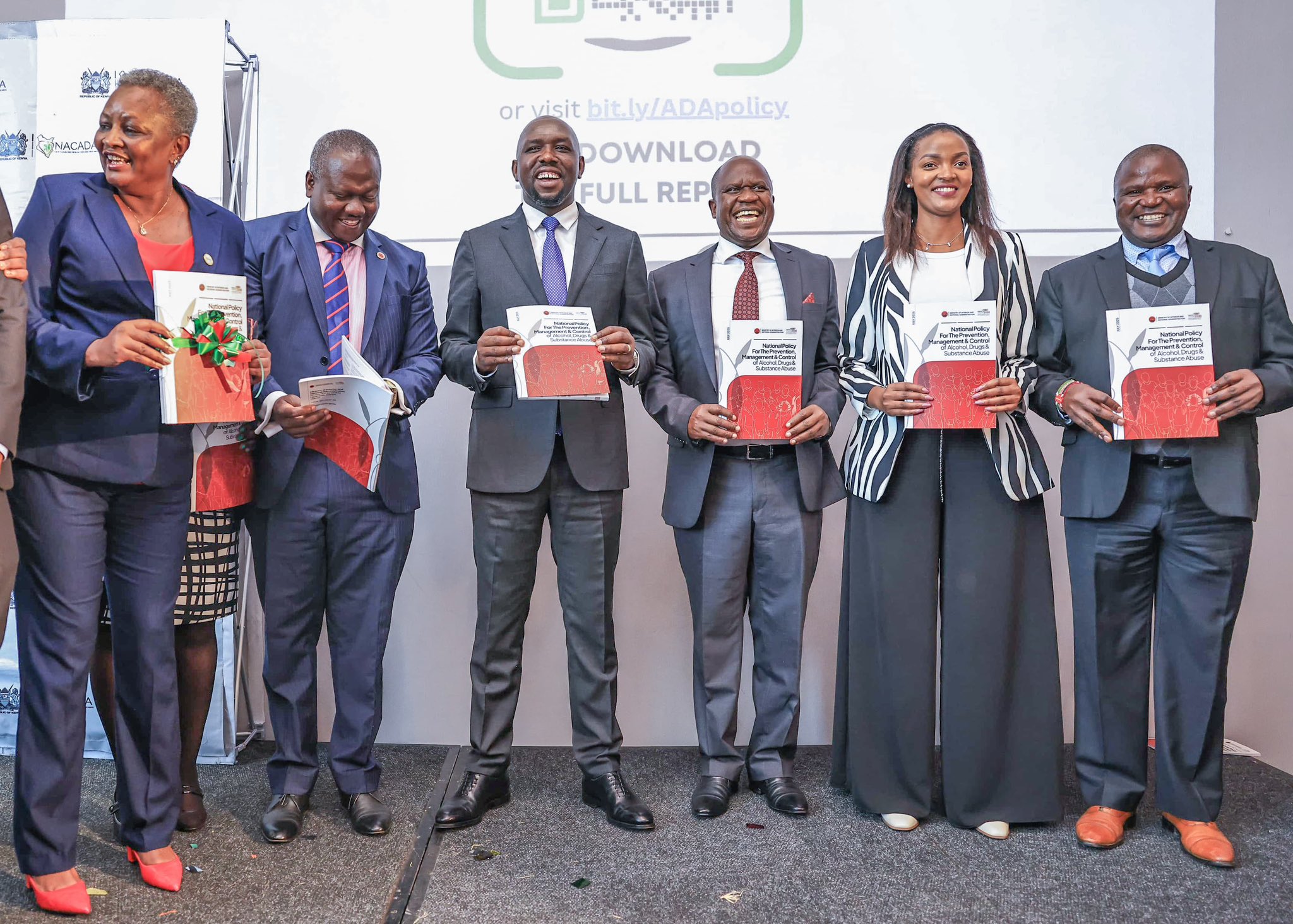
Nacada’s stand, language crisis dividing generations
Kenya's youth need genuine mentorship and responsible leadership
Alcohol will also not be served by or to individuals carrying offensive weapons
In Summary
 Interior Cabinet Secretary Kipchumba Murkomen with other NACADA officials duringh the launch of the policy/x
Interior Cabinet Secretary Kipchumba Murkomen with other NACADA officials duringh the launch of the policy/xIf you are under 21 and enjoy the occasional drink, the law is about to catch up with you.
The government has raised the legal age for buying, selling, handling, or consuming alcohol to 21 years under the newly launched 2025 National Policy on Alcohol, Drugs and Substance Abuse
The policy, officially launched by Interior Cabinet Secretary Kipchumba Murkomen Wednesday, introduces sweeping reforms aimed at reducing access, curbing harmful use, and protecting public health, particularly among young people.
“We must act to prevent a national crisis,” said Murkomen during the launch.
Nacada chairman Stephen Mairori stated that the policy puts prevention first, expands access to treatment, and ensures that our response is guided by data and public interest, not profits.
According to the policy, the minimum legal age for handling, purchasing, consuming, and selling alcohol has been raised to 21 years, up from 18.
It also places tight restrictions on where, how, and to whom alcohol can be sold, effectively rewriting the country’s alcohol landscape.
Among the banned sales points are supermarkets and convenience stores, online platforms and home delivery services, vending machines, hawkers and couriers, restaurants, cafes, and toy shops.
Others are residential premises and areas, as well as public beaches, parks, bus stops, petrol stations, amusement parks, recreational and sports facilities, medical centres, and along highways.
Alcohol consumption is also prohibited in many of these same locations, including restaurants and hotel dining areas, members' clubs, and all learning institutions, from nursery to university.
Licensing rules have also been tightened.
The policy prohibits any retail or wholesale alcohol outlet from operating within 300 metres of any nursery, primary, secondary, or higher learning institution.
Only the national government will be allowed to license manufacturers, importers, and exporters of alcoholic drinks, and all outlets must be fully tax compliant to receive or renew licences.
Importantly, off-license retailers, such as wines and spirits shops, supermarkets, and franchise stores, will no longer be licensed to sell alcohol under the new framework.
Each locality will face limits on the number and type of alcohol outlets allowed to operate, based on population density and local considerations. In addition, operating hours for all outlets will be regulated to reduce access.
The policy further bans the sale or consumption of alcohol to anyone accompanied by a child and at children-focused events such as festivals, sports days, and recreational activities.
Alcohol will also not be served by or to individuals carrying offensive weapons.
No person under 21 will be allowed to enter or remain inside alcohol-selling outlets, even when accompanied by an adult.
The government has also set a minimum alcohol package size of 250ml to discourage underage and excessive consumption.
In a move to eliminate conflicts of interest, the policy bars all public officers involved in alcohol regulation and enforcement, both at the national and county levels, from owning or operating alcohol businesses, directly or indirectly.
County governments have been tasked with setting up community-led licensing frameworks based on a multi-agency approach, with full compliance to national standards and strict protection from alcohol industry interference.
Beyond alcohol, the policy expands regulatory efforts to address emerging substances of abuse, including nicotine products and psychoactive medications.
It also encourages responsible serving practices in entertainment venues and supports safe alternative livelihoods for individuals currently involved in informal or illicit alcohol production.
Implementation of the new policy is set to begin immediately, with both national and county governments expected to roll out enforcement measures and public awareness campaigns in the coming months.
“This is a tough policy, yes,” Murkomen said, “but one that is absolutely necessary. It is a commitment to saving lives, safeguarding families, and securing the future of our nation.”

Kenya's youth need genuine mentorship and responsible leadership